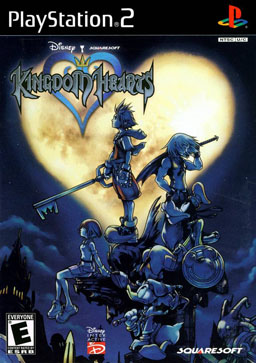
Kingdom Hearts is a 2002 action role-playing video game developed by Square for the PlayStation 2 video game console. It is the first game in the Kingdom Hearts series and is the result of a collaboration between Square and The Walt Disney Company. An expanded re-release of the game featuring new and additional content, Kingdom Hearts Final Mix, was released exclusively in Japan in December 2002. The Final Mix version of the game was later remastered in high definition and released globally as a part of the Kingdom Hearts HD 1.5 Remix collection for the PlayStation 3. The game was later ported and released as part of the bundled Kingdom Hearts HD 1.5 + 2.5 Remix collection for PlayStation 4 in March 2017, Xbox One in February 2020, Windows in March 2021, and Nintendo Switch in February 2022.

Marvel vs. Capcom is a series of crossover fighting games developed and published by Capcom, featuring characters from their own video game franchises and comic book series published by Marvel Comics. The series originated as coin-operated arcade games, though later releases would be specifically developed for home consoles, handhelds, and personal computers.
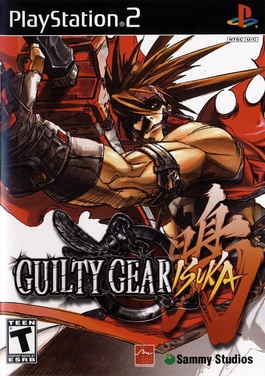
Guilty Gear Isuka is a 2D fighting video game developed by Arc System Works and published by Sammy Corporation. Announced by Arc in September, it was released on December 17, 2003, in Japanese arcades as the sixth installment of the Guilty Gear series. Later, the game was ported for a release on the PlayStation 2 (PS2), Xbox, and Windows in Japan. The PS2 version was brought to North America by Sammy, and, in Europe, the home console version was released by 505 Game Street and the PC version by Zoo Digital Publishing.

Soulcalibur II is a 2002 fighting game developed by Project Soul and published by Namco and the third installment in the Soulcalibur series of weapon-based fighting games. It is the sequel to Soulcalibur, which was released in July 1998. Originally intended to be released on Sega's NAOMI board, the game was released on the Namco System 246 arcade board before being ported to the PlayStation 2, GameCube, and Xbox in 2003.

Dead or Alive 3 is a 2001 fighting game developed by Team Ninja and published by Tecmo for the Xbox console as one of its launch titles. It is the third main entry in the Dead or Alive fighting series. Dead or Alive 3 improved upon the gameplay and graphics in beautiful detail compared to that of its predecessors.

Dead or Alive Xtreme Beach Volleyball is a beach volleyball game by Tecmo released in 2003 exclusively for the Xbox. The game was a departure from the rest of the Dead or Alive series which otherwise consisted of fighting games. It also marked the first game in the series to have a Mature rating from the Entertainment Software Rating Board.
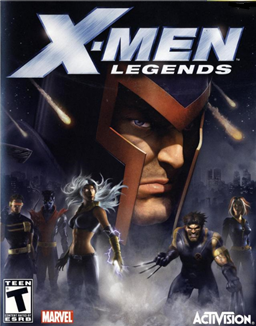
X-Men Legends is an action role-playing video game developed by Raven Software and published by Activision. It was released on the GameCube, PlayStation 2 and Xbox consoles in 2004. Barking Lizards Technologies developed the N-Gage port of the game, which was released in early 2005. Players can play as one of fifteen X-Men characters, with the ability to switch between four computer- or human-controlled characters at any time.

Metal Arms: Glitch in the System is a third-person shooter action-adventure video game, developed by American team Swingin' Ape Studios, published by Vivendi Universal Games and their subsidiary Sierra Entertainment and released in 2003. The game follows a robot named Glitch as he joins forces with the Droids in their fight against General Corrosive and his Milbots.
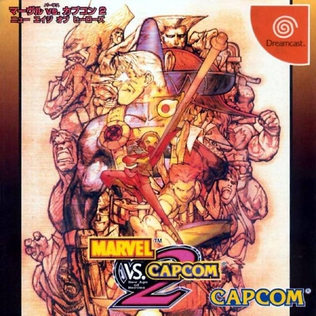
Marvel vs. Capcom 2: New Age of Heroes is a crossover fighting game developed and published by Capcom. It is the fourth installment in the Marvel vs. Capcom series, which features characters from both Capcom's video game franchises and comic book series published by Marvel Comics. Originally released in Japanese arcades in 2000, the game received ports to the Dreamcast, PlayStation 2, PlayStation 3, Xbox, Xbox 360, and iOS devices over the span of twelve years.

Deathrow is a 2002 sports video game developed by Southend Interactive and published by Ubi Soft for the Xbox as an exclusive. Deathrow's development began in May 1999 as an online PC game. In early 2001, Southend transitioned to an Xbox console release, which let the team use pixel shaders, bump mapped textures, and specular lighting. Deathrow was built on an in-house 3D game engine and was Southend's first full release.
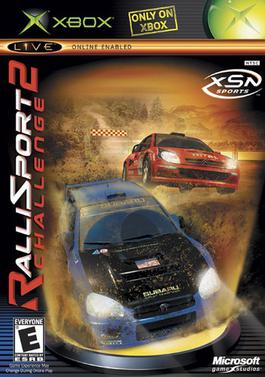
RalliSport Challenge 2 is a rally racing video game developed by Digital Illusions CE and published by Microsoft Game Studios for the Xbox in 2004. Released as a sequel to the 2002 video game RalliSport Challenge, the game introduced several new features, including a career mode, additional cars, and track types with new environments, including night driving and ice racing. Digital Illusions CE developed RalliSport Challenge 2 as a completely new approach from its predecessor, with the developers aiming to create a more realistic and diverse simulation of rally racing by introducing added environmental effects and an improved car damage and handling model.
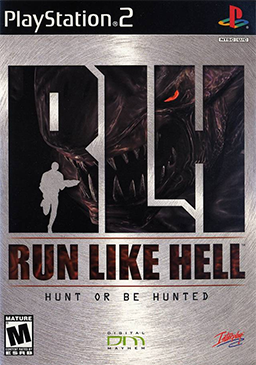
Run Like Hell is a third-person shooter video game developed by Digital Mayhem, published by Interplay Entertainment and distributed in Europe by Avalon Interactive for the PlayStation 2 in late 2002 and for Xbox in early 2003. In Japan, the PS2 version was released by Capcom in 2004.
The Xbox 360 is a home video game console developed by Microsoft. As the successor to the original Xbox, it is the second console in the Xbox series. It competed with Sony's PlayStation 3 and Nintendo's Wii as part of the seventh generation of video game consoles. It was officially unveiled on MTV on May 12, 2005, with detailed launch and game information announced later that month at the 2005 Electronic Entertainment Expo (E3).
Metro3D, Inc. was an American video game developer and publisher. Based in San Jose, California, and founded in 1998, the company released several games for the Dreamcast, Game Boy Color (GBC), Game Boy Advance (GBA), and PlayStation 2 (PS2) consoles.

Sonic Colors is a 2010 platform game published by Sega. It follows Sonic's quest to stop his nemesis Doctor Eggman from enslaving an alien race and taking over the world. The gameplay is similar to prior Sonic games, with players collecting rings and defeating enemies; the camera perspective often switches from third-person to side-scrolling perspectives. The game also introduces Wisps, power-ups the player can use to increase attack power and reach new areas.
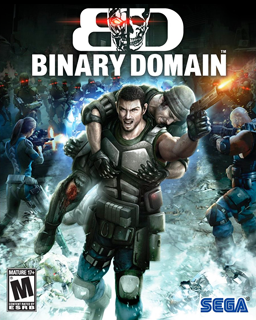
Binary Domain is a third-person shooter video game developed by Ryu Ga Gotoku Studio and published by Sega. It was released for PlayStation 3 and Xbox 360 in February 2012 and Windows in April 2012. The game is set in Tokyo, Japan, in the year 2080. It features innovative artificial intelligence technology.
Online console gaming involves connecting a console to a network over the Internet for services. Through this connection, it provides users the ability to play games with other users online, in addition to other online services.
The year 2014 saw a number of events in the video game industry. No new major consoles were released, but updates and upgrades were: the New Nintendo 3DS was released in Japan and Oceania, and Sony released new model 2000 PS Vita systems in Europe & North America. In video game-related corporate acquisitions, Amazon purchased the online video game streaming service Twitch, and Facebook acquired the virtual reality company and product Oculus. Nintendo released Amiibo in 2014, companion figurines that could be scanned by the 3DS and Wii U systems. On Twitter and other Internet social media, the Gamergate controversy began.

Xbox is a video gaming brand that consists of five home video game consoles, as well as applications (games), streaming service Xbox Cloud Gaming, and online services such as the Xbox network and Xbox Game Pass. The brand is produced by Microsoft Gaming, a division of Microsoft.















